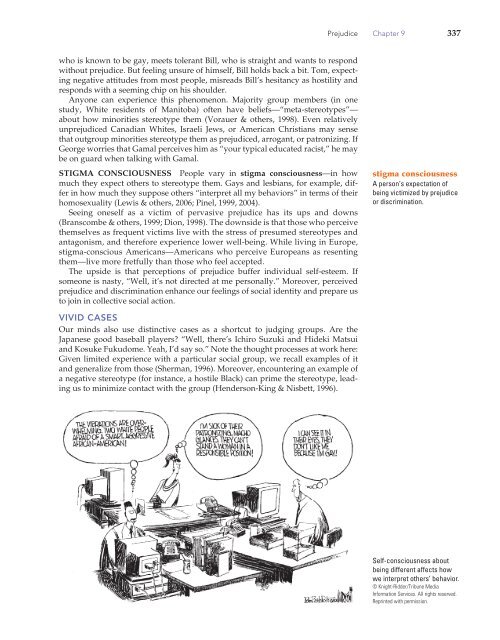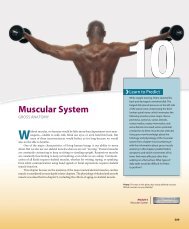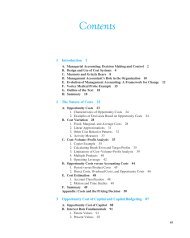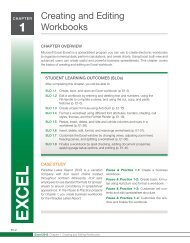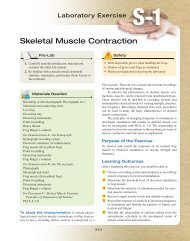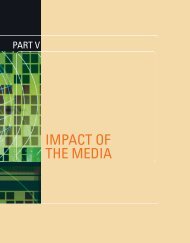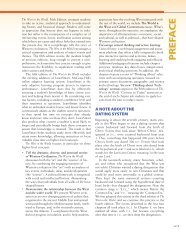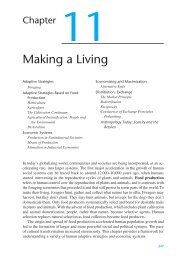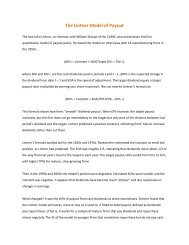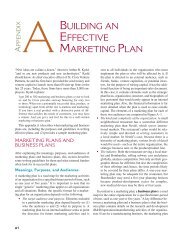Chapter 9: Prejudice: Disliking Others (2947.0K) - Bad Request
Chapter 9: Prejudice: Disliking Others (2947.0K) - Bad Request
Chapter 9: Prejudice: Disliking Others (2947.0K) - Bad Request
You also want an ePaper? Increase the reach of your titles
YUMPU automatically turns print PDFs into web optimized ePapers that Google loves.
who is known to be gay, meets tolerant Bill, who is straight and wants to respond<br />
without prejudice. But feeling unsure of himself, Bill holds back a bit. Tom, expecting<br />
negative attitudes from most people, misreads Bill’s hesitancy as hostility and<br />
responds with a seeming chip on his shoulder.<br />
Anyone can experience this phenomenon. Majority group members (in one<br />
study, White residents of Manitoba) often have beliefs—“meta-stereotypes”—<br />
about how minorities stereotype them (Vorauer & others, 1998). Even relatively<br />
unprejudiced Canadian Whites, Israeli Jews, or American Christians may sense<br />
that outgroup minorities stereotype them as prejudiced, arrogant, or patronizing. If<br />
George worries that Gamal perceives him as “your typical educated racist,” he may<br />
be on guard when talking with Gamal.<br />
STIGMA CONSCIOUSNESS People vary in stigma consciousness —in how<br />
much they expect others to stereotype them. Gays and lesbians, for example, differ<br />
in how much they suppose others “interpret all my behaviors” in terms of their<br />
homosexuality (Lewis & others, 2006; Pinel, 1999, 2004).<br />
Seeing oneself as a victim of pervasive prejudice has its ups and downs<br />
(Branscombe & others, 1999; Dion, 1998). The downside is that those who perceive<br />
themselves as frequent victims live with the stress of presumed stereotypes and<br />
antagonism, and therefore experience lower well-being. While living in Europe,<br />
stigma-conscious Americans—Americans who perceive Europeans as resenting<br />
them—live more fretfully than those who feel accepted.<br />
The upside is that perceptions of prejudice buffer individual self-esteem. If<br />
someone is nasty, “Well, it’s not directed at me personally.” Moreover, perceived<br />
prejudice and discrimination enhance our feelings of social identity and prepare us<br />
to join in collective social action.<br />
VIVID CASES<br />
Our minds also use distinctive cases as a shortcut to judging groups. Are the<br />
Japanese good baseball players? “Well, there’s Ichiro Suzuki and Hideki Matsui<br />
and Kosuke Fukudome. Yeah, I’d say so.” Note the thought processes at work here:<br />
Given limited experience with a particular social group, we recall examples of it<br />
and generalize from those (Sherman, 1996). Moreover, encountering an example of<br />
a negative stereotype (for instance, a hostile Black) can prime the stereotype, leading<br />
us to minimize contact with the group (Henderson-King & Nisbett, 1996).<br />
<strong>Prejudice</strong> <strong>Chapter</strong> 9 337<br />
stigma consciousness<br />
A person’s expectation of<br />
being victimized by prejudice<br />
or discrimination.<br />
Self-consciousness about<br />
being different affects how<br />
we interpret others’ behavior.<br />
© Knight-Ridder/Tribune Media<br />
Information Services. All rights reserved.<br />
Reprinted with permission.


